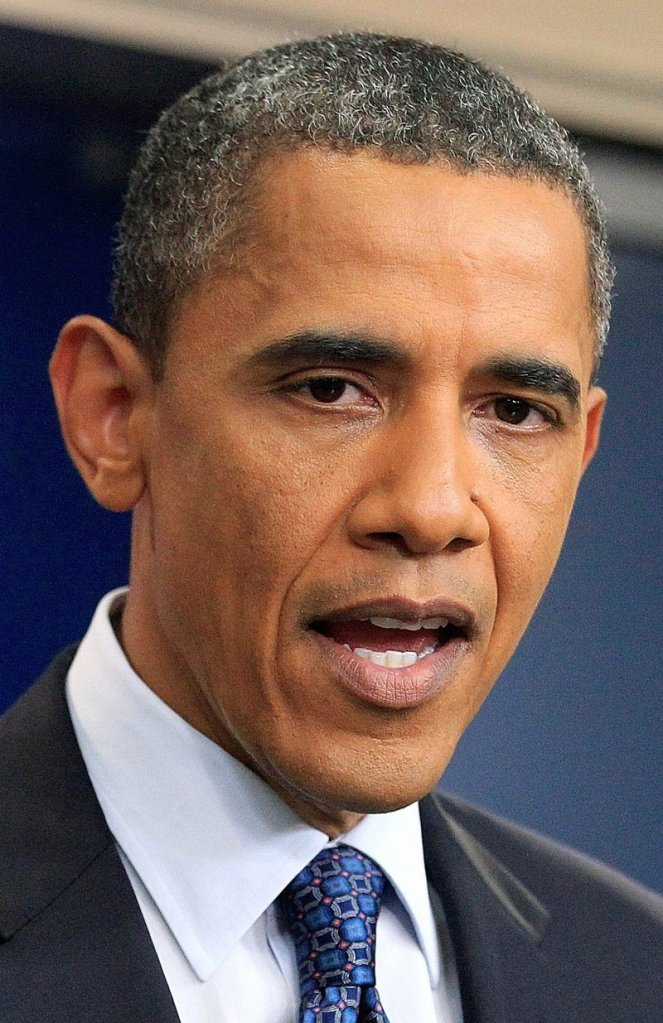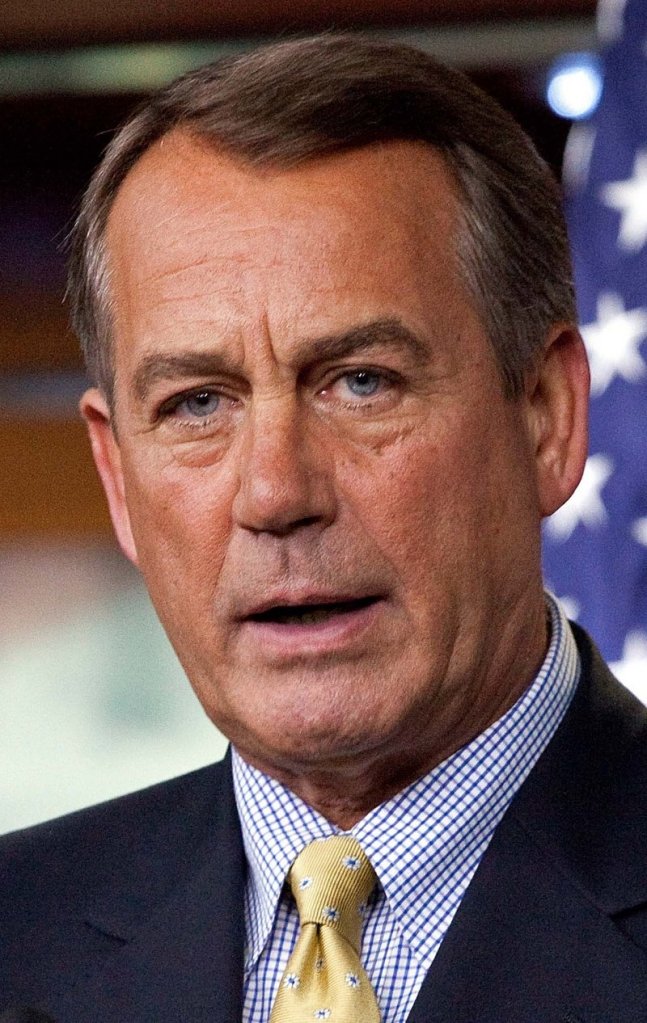WASHINGTON – House Speaker John Boehner abandoned talks with the White House on Friday over a landmark debt-reduction deal, throwing into chaos efforts to raise the legal limit on government borrowing just 11 days before the U.S. Treasury is due to run out of cash.
Facing the specter of the government’s first default, President Obama summoned congressional leaders to the White House for an emergency meeting this morning, and Senate leaders rushed to revive a fallback strategy for raising the debt limit before the Aug. 2 deadline.
“We have now run out of time,” a visibly angry Obama said at an impromptu White House news conference held after Boehner, R-Ohio, called to say he was walking out on the talks for the second time in two weeks — again citing differences over taxes. Now, Obama said, “one of the questions that the Republican Party is going to have to ask themselves is: Can they say yes to anything?”
Late Friday, a senior GOP aide said House leaders had “no idea” how to craft a plan to raise the $14.3 trillion debt limit that could win approval from the Democratic-controlled Senate and the Republican-led House. Talks were under way between Boehner and Senate leaders, but House Republicans continued to object to a developing Senate strategy to authorize Obama to raise the debt limit through 2013 without explicit congressional approval.
Boehner was clear about the reasons for his decision. The White House, he told reporters at his own news conference, “insisted on raising taxes.”
The collapse of the talks provided a dramatic end to a whirlwind week that began last Friday when Boehner alerted administration officials that he was ready to try again “to do something big” to control the debt, as a GOP aide put it. In the ensuing days, the two sides forged common ground on a two-stage strategy for raising the debt limit and cutting more than $4 trillion out of the federal budget through 2021.
That plan called for unprecedented cuts in agency spending, including at the Pentagon, and significant changes to Medicare and Social Security, the biggest drivers of future borrowing — a significant concession for Democrats. It also included an overhaul of the tax code that would lower personal and corporate income tax rates but reduce an array of popular tax breaks, generating about $1 trillion in extra revenue over the next decade.
The package held the promise of stabilizing the debt.
The talks broke down, however, as the two sides tried to reach agreement on the magnitude of the tax and entitlement changes and how to force Congress to meet the goals of the plan. Boehner wanted a short-term increase in the debt ceiling that would force Congress to cut entitlement programs and rewrite the tax code before the limit could be increased again next spring. The White House opposed that approach, and instead suggested a long-term debt-ceiling increase coupled with a trigger that would automatically cut taxes if the reforms were not enacted.
As the two sides tussled over the hardest ideological questions, administration officials said they tried to satisfy Boehner’s demands. But by Friday, the speaker concluded that the vast philosophical gulf between Republicans and the White House could not be bridged.
Boehner said Obama is “simply not serious” about cutting Social Security and Medicare, unless accompanied by a tax increase of $1.2 trillion over the next decade — $400 billion more than what was included in the handshake agreement GOP aides said Boehner made with Treasury Secretary Timothy Geithner last weekend.
“Dealing with the White House is like dealing with a bowl of jello,” the speaker said. “There was an agreement with the White House for $800 billion in revenue. It was the president who walked away from this agreement.”
Obama countered that he had offered Boehner “an extra-fair deal” on “the biggest debt-reduction package that we’ve seen in a very long time.” Obama said it would have raised taxes significantly less than a bipartisan Senate plan presented this week by the so-called Gang of Six and endorsed by the third-ranking Republican in the Senate, Lamar Alexander of Tennessee.
Late Thursday, Obama even offered to reduce his revenue target, White House officials said, if Boehner would accept smaller cuts to entitlement programs.
As it was, Obama said he put $650 billion in such reductions on the table, along with sharp cuts to government agencies, that caused consternation among Democratic lawmakers and forced him to “take a lot of heat from my party.”
House GOP leaders have repeatedly pulled the plug on efforts to forge agreement on a plan to control the national debt, Obama said. Democratic leaders had been willing to consider provisions that would have caused them considerable political pain among the elderly, unions and the party’s liberal base, he added. He also emphasized his willingness to compromise, noting that “I’ve been left at the altar now a couple of times.”
He noted that he had offered to make further cuts to Medicare, even after Republicans denounced Democrats in last fall’s midterm campaigns for cutting Medicare as part of their overhaul of the health-care system.
Until Friday, when Boehner did not return a phone call from the president, Obama said “my expectation was that Speaker Boehner was going to be willing to go to his caucus and ask them to be willing to do the right thing” on taxes.
As policymakers braced for another full weekend of urgent meetings, Obama placed just one condition on the path forward, repeating his opposition to a short-term debt-ceiling extension that would force the two sides to replay the same battle in just a few months — an approach some House Republicans are considering. Instead, he insisted on an increase sufficient to pay the bills through the 2012 election — about $2.5 trillion.
Boehner, meanwhile, refused to back away from his demand that any increase in the debt limit be matched with spending cuts dollar for dollar — creating a huge potential obstacle.
The Senate’s top officials, Majority Leader Harry Reid, D-Nev., and Minority Leader Mitch McConnell, R-Ky., were at work on a fallback plan that would authorize Obama to raise the debt limit by $2.5 trillion in three installments without congressional fingerprints. Instead, Congress would disapprove of the increase, and Obama would be forced to veto their disapproval.
That would place the entire political burden on Obama, a burden the president said he is willing to accept. But Senate leaders have identified only about $1.5 trillion in spending cuts to pair with the debt-limit increase — a sum that falls far short of meeting Boehner’s dollar-for-dollar condition.
McConnell and Reid issued statements late Friday expressing their disappointment that talks between Obama and Boehner had collapsed, although both men had long been skeptical of the speaker’s ability to build support for an ambitious deficit deal made with a president despised by many members of Boehner’s party. As they prepared to head to the White House this morning, both men pledged to press forward.
Lawmakers have few other options for raising the debt limit. On Friday morning, the Senate defeated, in a party-line vote, a plan trumpeted by House and Senate conservatives that would have placed strict limits on federal spending and linked a debt-limit increase to a constitutional amendment requiring a balanced budget.
By lunchtime, a sense of foreboding descended on the Capitol as word spread that Boehner had not returned the president’s call. Reid and McConnell spent Friday afternoon shuttling between each other’s offices, working to revive the plan they had just set aside.
Neither would comment on their talks. But Obama warned that they had better come up with a solution before the collapse of negotiations wreaks havoc on financial markets.
Copy the Story Link
Send questions/comments to the editors.




Success. Please wait for the page to reload. If the page does not reload within 5 seconds, please refresh the page.
Enter your email and password to access comments.
Hi, to comment on stories you must . This profile is in addition to your subscription and website login.
Already have a commenting profile? .
Invalid username/password.
Please check your email to confirm and complete your registration.
Only subscribers are eligible to post comments. Please subscribe or login first for digital access. Here’s why.
Use the form below to reset your password. When you've submitted your account email, we will send an email with a reset code.